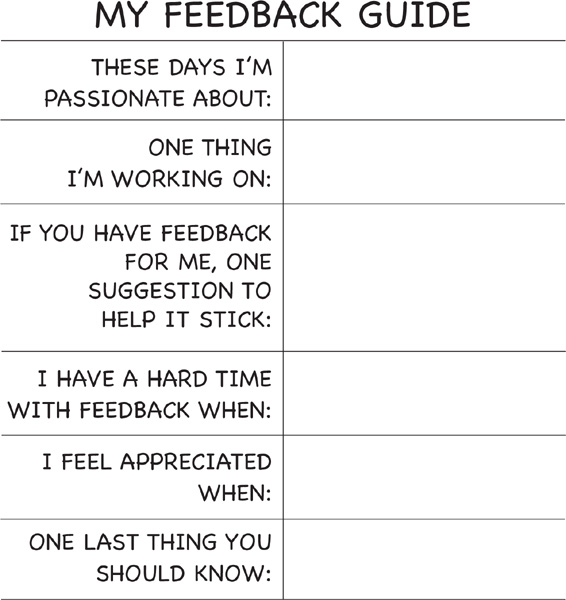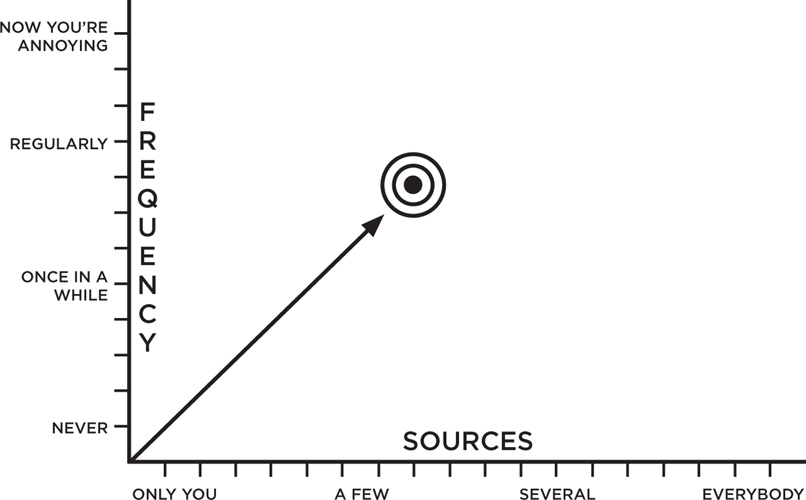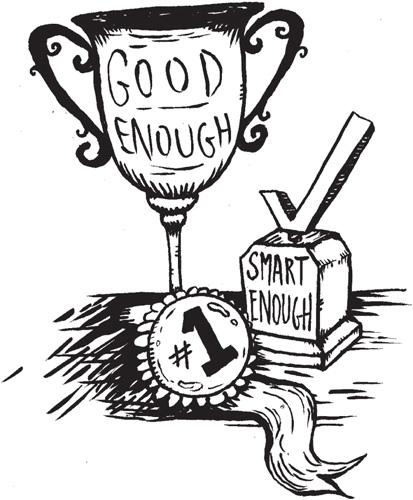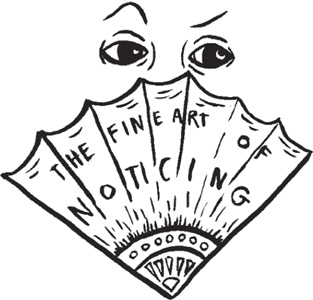INDIVIDUALS WHO PROACTIVELY SEEK FEEDBACK FROM OTHERS WITH THE INTENTION OF SELF-DEVELOPMENT OR GROWTH
CHAPTER 6
SEEKING FEEDBACK
AS WE GROW OUR MOVEMENT to inspire great feedback practices, we’re first enlisting Seekers. After all, it’s the most important role any of us can play in fixing feedback. Why? Because the movement starts within. With ourselves. Seeking, not knowing. Learning, not always telling.
Research tells us that organizations that shift from giving feedback to asking for it drive performance improvement, growth mindset, effective decision making, and stronger, more resilient teams.1
The benefits of being a Seeker are many:
• It’s the ultimate trust generator. Seeking demonstrates humility and shows you value the perspectives of others.
• People who ask for feedback feel greater autonomy and control.
• When you’re seeking, you’re more likely to act on the feedback.
• Asking means you get to focus on the information you need to meet your goals.
• As the Seeker, you choose the time and the place, ensuring that you’ll be in the right mindset for the conversation.
• Seeking first is the best way to start a movement. (Here’s your chance to go first if you’re a leader or manager!)
As Seeker, your role is to build connections with others and nurture those trusted relationships to help you learn and grow. This is your course to set. Perhaps your goal is to build a skill in a new discipline. If so, then it makes sense to target others who have the skill you want and request their insights. You might ask, “What’s the best way to get started? What experiences helped you build your capabilities? Am I on the right track so far?”
You may be seeking something deeper. Perhaps you’ve recognized that you’re struggling with certain work relationships. In this case, you may be asking others to reflect on and share how they’re seeing you show up, if there are behaviors they’re observing that you may not be aware of, or what they’ve experienced personally when collaborating with you. In any of these scenarios, the key is that you’re doing the asking, so you’ll focus the discussion and then decide what you’ll do with the information you receive. All in all, that’s a powerful place to be!
CREATE CONNECTIONS
At this point you’re well versed in the concept that connections are vital to making feedback work. As a Seeker, connections are vital to the quality of the feedback you’ll harvest and the strength of the relationships you will form.
Multiple studies have shown that people dislike giving feedback just as much as, if not more than, receiving it. So, while you may think the Extender is always in the driver’s seat, your request for feedback may actually ignite fear in them. Three easy steps can prevent that from happening:
1. Build a relationship before you go seeking. Having a platform from which you’re making the request is key.
2. Provide context. Tell them why you’re asking and why their insights are important to you.
3. Use techniques that help them feel prepared. I’m talking about focused requests based on what they are noticing.
Once you’ve created a relationship and you’ve helped those you’re seeking insights from understand your expectations, they’re far more likely to feel safe and comfortable in the Extender role you’ve asked them to play. Seeking first may be the most effective catalyst for creating connections and building sustainable, trusted relationships. Seek and you shall find!
LEADERS GO FIRST
Are you a leader? Maybe your title is CEO, VP, or director, or maybe it’s team lead or project manager. Perhaps you have a thousand people working under you, or just one or two. Regardless of your span of control or your title, if you’re leading in any capacity, you need to know what I’m about to tell you.
Thirty years of research has identified the top factor in driving change: leadership. Change happens when leaders are engaged and committed. It often fails when they are not. Heeding this insight, we know that to change the culture of an organization and the actions and habits of a group of people, leaders need to be committed to the change and get out front to blaze the trail.
Leading doesn’t mean sending a perfunctory email or adding a slide to the deck for the annual meeting to let folks know you’re all “rah-rah” about feedback. Leading means embracing and modeling the new habits, new behaviors, and new culture you’re working to create. Simply said, leaders need to walk the talk. This shouldn’t be taken lightly—it’s a commitment. Once you sign up to lead, your task is to stay the course. Now, we all have our off days, but the key to being a successful leader is to seek feedback from others so you can be aware of them when you might not recognize them yourself, acknowledge them honestly when they happen (which builds credibility in your team’s eyes), and get back on track quickly once you know that you’ve tripped up. In short, get some feedback on how you are approaching feedback.
The success of this movement depends heavily on placing the emphasis and focus on the Seeker. We want people to seek first, and we want Seekers to take control. Creating an environment where seeking is commonplace will be the catalyst for true and sustainable culture change.
To get there we need leaders to, well, lead. Be the first in your organization to consistently ask for feedback. Openly share with others what you’re up to, invite them to share their perspectives, and encourage them to become fellow Seekers. Not only will this activity give impetus to the movement we’re trying to create, it will also send a strong signal about your leadership style. And the ultimate bonus is how much you’ll benefit and grow from the information you’ll glean.
Here are just a few reasons for leaders to begin seeking:
• You’ll build new trusted connections with those around you and deepen existing ones.
• You’ll lessen the fear in others when you ask them to help you.
• You’ll reinforce the idea that none of us is perfect, and that it’s okay for you and everyone on your team to have some flaws and make some mistakes now and then.
• You’ll set a precedent that your people can come to you to share both the good and the bad, which will be liberating for them and enlightening for you.
• You’ll boost your own leadership game. (Remember the finding in the Folkman and Zenger study I referenced way back in chapter 2 that leaders who ranked in the top 10 percent for asking for feedback also ranked at the top for overall leadership?)
KNOW YOUR FEEDBACK SELF
When we feel safe, we have better conversations. This is true for both Seekers and Extenders. In an atmosphere of safety, Seekers will be more transparent and authentic, and Extenders are more likely to share openly. Take a little time to consider what’s important to you and what elements are key to your own feeling of safety. Capture your thoughts on our simple Feedback Guide template, and then share it with t hose you’re seeking insights from so they feel comfortable about what you’re asking of them. Update your Feedback Guide as you learn more about your true feedback self and remember to keep sharing it with those you invite into your feedback ecosystem.

HITTING RESET: CHANGE YOUR ROLE
If you’re a “my way or the highway” type—one who’s always quick with harsh judgments and frank opinions—then imagine how pleasantly surprised your colleagues will be when you approach them with humility and sincerity to ask for their honest input on your performance. It’s likely you’ll need to lay a little groundwork to earn trust and signal that your metamorphosis into a Seeker is authentic. You can do this by acknowledging your past shortcomings and by detailing the work you’re doing to shift how people experience you. Don’t push too hard, though. Start small and enlist them to let you know when you stray from your path to better listening and sharing. Your trust in them will provide them the security to trust in you.
Seekers, you need to be bold and get out there to kick some ask. By doing so you’ll be taking the reins of this feedback movement and leading it where it needs to go. As you do so, remember these four tips:
ASK IN ADVANCE. Asking in advance is the most effective way to get what you seek. It clarifies for the Extender the information you’re seeking, and it allows them time to consider and prepare their answer. Giving them advance notice avoids putting them in the awkward position of feeling on the spot, and it will usually improve the quality of the feedback they provide.
GIVE THEM PERMISSION. When you ask for feedback, you give those generous Extenders the permission to be frank and honest. Remember, we humans don’t like giving feedback, but when permission is offered, we can steer clear of fear and feel more comfortable and confident extending truth. By giving them permission, you’re contracting with them psychologically. You’re offering them the freedom to speak candidly while providing detail on what kind of feedback you’re seeking and why. With the right tone and clear expectations set in advance, your time together can be spent mining for truth and building trust.
ASK THEM TO START NOTICING. If you’re working on improvement in a key area, at a specific skill, or in specific situations, ask others to turn on their noticing on your behalf. Let them know the nature of the feedback you’re looking for and when you’ll be looping back to see what they observed. Ask them to provide, as much as possible, a descriptive view of what they noticed.
MAKE THE CHOICE. If fairness, focus, and frequency were involved, you are now holding a valuable nugget of feedback to process. You have the right to choose what happens next. Your power lies in choosing.
A final word on seeking: I want to reinforce that asking for feedback gets you ahead of your own “triggers.” It not only gives the Extender time to prepare, it also helps you take control and avoid that problematic state of managing the things that tend to push your emotional buttons. It’s not easy to ask, but when we shift our mindset from “prove” to “improve” and start seeking feedback from those who witness us day in and day out, we can fundamentally change our lives for the better.
FOCUS YOUR ASK
Focusing the conversation on what will be most useful to you is Job One for Seekers. There are two key reasons why a focused ask should be your seeking priority:
• Research indicates that we are likely to stimulate a fear response in a potential Extender when we hit them with a broad ask like “How am I doing?” The best means for lowering their stress is to request feedback that’s specific and focused, such as, “When I present to the IT team today, could you pay attention to how much eye contact I’m making? I’ve also been working on keeping my feet planted and not walking around or pacing, so monitor that as well, please. I think my content will connect more if I improve in those areas.”
• A focused ask allows you to put your energy, and that of the Extender, into something that is valuable and relevant to you. Your targeted ask allows you to take control and guide the direction of the feedback. You get what you need. The Extender gets to respond to a clearly defined request. You don’t have to filter through a laundry list of offerings, and the Extender isn’t wasting time giving you advice on something you couldn’t care less about. It’s a win-win!
While focusing your feedback ask is a priority, you may also consider taking a leap of faith and ask a trusted colleague to let you know about any blind spots they’ve noticed. Maybe they’ve witnessed you drop the ball on listening recently or spread yourself too thin when a tight deadline on a certain project deserves your undivided attention. You’ll get the double benefit of hearing feedback about something that’s high on the list of skills you value, and something that you might not be seeing.
Remember that asking for focused feedback is key to building our movement. You’ll serve as a model to those around you, who will surely be inspired to seek feedback for themselves.
MORE SOURCES = BETTER LEARNING
The more sources of feedback you enlist, the more you’ll increase the learnings and insights you can gather. Additionally, getting feedback from a cross-section of people makes it more likely that you’ll get a truer picture of your performance than if you’re relying only on the observations of one coworker. If you’re working on a problem, trying to improve your game, tackling that next level on the competency ladder, or striving to be a better leader, then gathering perspectives from numerous angles will increase the fairness and accuracy of the feedback that you take in.
Of course, I’m not talking about running around yelling, “Tell me what to do! Tell me what to do!” I’m talking about a good, solid, focused ask from multiple sources (ideally, one that’s made in advance). Your contributors should include those who have challenged you to think differently in the past, or those who’ve been critical of your work from time to time. When you step out of your safety zone in terms of whom you seek out, you might learn that what you bring to the table has more impact (or a different impact) than you thought. When you welcome more voices into the conversation about your development, you’re likely to be surprised, often pleasantly, by what you glean.
I’m a huge fan of peer feedback. Why?
THEY KNOW YOU. Your peers are the people who know you best. They’re by your side every day. They see you at your best and at your worst, and they understand better than most the kinds of challenges you face as you strive to grow and advance.
PEER FEEDBACK FUELS A CULTURE OF FEEDBACK. Encouraging a culture of peer-to-peer feedback encourages the level of recognition within a team and builds a highly energizing work environment that leads to greater engagement and productivity. A recent Globoforce study found that peer-to-peer recognition was nearly 36 percent more likely to have a positive impact on financial results than manager-only recognition.2 When employees receive recognition or feedback exclusively from their manager, there is only one definitive voice being heard. But when we invite others into the conversation and everyone feels invested in a culture of feedback, we hear a chorus of voices.
DIVERSITY REDUCES BIAS. Seeking more voices promotes inclusion and brings us broad and diverse perspectives. Increasing the points of view lessens the impact of unconscious bias from any single individual.
ONE BITE IS RIGHT
Clearly, I want you to seek focused feedback frequently. What I don’t want you to do is bite off more than you can chew. Be sure that the skill, topic, or behavior you choose to focus your seeking and improvement efforts on is meaningful enough to make a difference, yet narrow enough to be something you can make progress on within a reasonable time frame. Moreover, stay focused on one thing at a time. Trying to work on multiple agendas will only dilute your success and increase your frustration. It’s like taking golf lessons from an overeager coach who’s doling out a steady stream of swing thoughts for you to try to manage: Keep your head down, don’t overswing, turn your shoulders and hips together... Enough! One thing at a time, please! Trust me, maintaining a narrow focus will keep you in your happy place, make it easy for those around you to help, and prevent you from hurling your mental club into the feedback pond in anger.
ASK FOR THE GOOD STUFF
Don’t shy away from the good stuff. I encourage you to shore up your strengths, hone the crafts you love and excel at, and find your superpowers. Playing to your strengths is the secret to a happy and meaningful life. So, if they’re that important, we better know what they are and how, when we let our strengths shine, they bring value to others. And the best way to know is simply to ask.
As you strive to recognize your strengths, take along these two pearls of wisdom borrowed from Marcus Buckingham, the “Strengths Guru”:
• Your strengths are not what you’re good at, and your weaknesses are not what you’re bad at. If you’re good at something, but it drains you—that’s not a strength, that’s a weakness. A strength is an activity that makes you feel strong, just as a weakness is an activity that makes you feel weak.
• You will grow the most, learn the most, and develop the most in your areas of strength. Your strengths are your areas of opportunity for growth, so when looking to invest, put your effort there!
Make sure your seeking strategy helps you recognize the things you love, then let that insight help you fall in love with your work. There is no better gift to yourself or your organization.
FIND YOUR BLIND SPOTS
One of the very first lessons we get in driver’s ed is to watch out for blind spots, the sections on either side of the road behind us that aren’t visible in our side-view mirrors and where danger may lurk. We all have personal or work-related blind spots, too. During the process of becoming a Seeker, we need to be mindful of what may be hidden from view in these areas.
Sleuthing out your blind spots is not a journey for the timid, but it can lead to profound outcomes. On the next page you’ll find a great exercise we use at PeopleFirm to reveal blind spots. You’ll want to be especially deliberate about who you choose to help you with this exercise; turn to a trusted friend or advisor.
EXERCISE: BUILDING
MUSCLE AROUND
BLIND SPOTS
1. For a week, use the Fine Art of Noticing to ask for blind-spot feedback from one person each day. It might be as simple as this:
“Is there anything about me that I don’t seem to see when I’m interacting with my customers, but is obvious to you?”
2. Never ask the same person twice.
3. Listen to and compare the feedback you get. Any “aha’s” t here? Then make your plan to grow and improve.
FOCUS ON PROGRESS
Messed something up recently? Fell short of your target? Missed a key performance metric? Then by all means cop to it as you seek, but don’t make your mea culpa the focus of the conversation. Quickly move on to ask for coaching that can help you succeed the next time around.
If you say, “I missed this target and I feel badly about it. Now I’m looking for some guidance on specifically how to clean this up and avoid another miss next month. Would you be willing to help me think this through?” it’s more likely to get you to where you need to go than, “Oh, man, I missed my target. I’m hopeless!”
Focusing on what you need (not necessarily on what you want) and when you need it to achieve the specific progress you’re targeting makes it more likely that you’ll take in and retain the feedback, then use it in a way that is effective for you.
FOCUS ON THE FUTURE
At this point I feel compelled to remind you what all this asking is about. It’s about your future. It’s about your aspirations. As you set out on your seeking journey, don’t lose sight of the ultimate goal: building a better you.
In this rapidly changing and complex world, we also need to allow for flexibility and give ourselves some grace when our expectations change, when we’re in the midst of learning something new about ourselves, or as the demands of work evolve. Whether your dreams hold strong or bend with the wind, you as Seeker are in charge. You can choose to stay the course or opt for a detour based on what you’re learning. Regardless of your path or your career status, keep your development agenda and objectives front and center and let feedback fuel your targeted growth and learning.
MAKE A PLAN
Want to be sure your seeking is successful? Make a plan! Here are a few reminders to help you get going:
• Begin with the end in mind and work backward. Keep your eyes on the prize—your future—and let that guide what you’re seeking.
• Make a list of the people who can help. Remember to diversify your ask by engaging people who bring different perspectives. Validate your list with others to help you discover people you might be missing.
• Prepare to ask for focused feedback on a topic important to you. Consider what one question, if answered, would bring the most value.
• Connect first. Start small and take it one step at a time.
• Ask in advance and share your Feedback Guide with those you’ve asked.
• Give your Extenders some time to do some “noticing.”
Above all, pause often to celebrate your progress and openly share your gratitude with those who’ve contributed to the better you. Oh, and offer to do the same for them. After all, the feedback revolution will be built one connection at a time.







